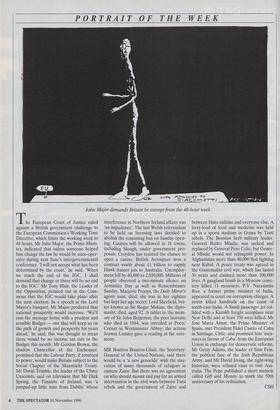PORTRAIT OF THE WEEK
John Major demands Britain be exempt from the 48-hour week The European Court of Justice ruled against a British government challenge to the European Commission's Working Time Directive, which limits the working week to 48 hours. Mr John Major, the Prime Minis- ter, indicated that unless someone helped him change the law he would be unto-oper- ative during next June's intergovernmental conference. 'I will not accept what has been determined by the court,' he said. 'When we reach the end of the IGC, I shall demand that change or there will be no end to the IGC.' Mr Tony Blair, the Leader of the Opposition, pointed out in the Com- mons that the IGC would take place after the next election. In a speech at the Lord Mayor's banquet, Mr Major predicted that national prosperity would increase. 'We'll ram the message home with a prudent and sensible Budget — one that will keep us on the path of growth and prosperity for years ahead,' he said; this was thought to mean there would be no income tax cuts in the Budget this month. Mr Gordon Brown, the shadow Chancellor of the Exchequer, promised that the Labour Party, if returned to power, would make Britain subject to the Social Chapter of the Maastricht Treaty. Mr David Trimble, the leader of the Ulster Unionists, said on television that Mr Dick Spring, the Tanaiste of Ireland, was 'a jumped-up little man from Dublin' whose interference in Northern Ireland affairs was `an impudence'. The last Welsh referendum to be held on licensing laws decided to abolish the remaining ban on Sunday open- ing. Casinos will be allowed in 18 towns, including Slough, under government pro- posals; Croydon has resisted the chance to open a casino. British Aerospace won a contract worth about £,1 billion to supply Hawk trainer jets to Australia. Unemploy- ment fell by 40,800 to 2,030,000. Millions of people observed a two-minute silence on Armistice Day as well as Remembrance Sunday. Marjorie Proops, the Daily Mirror's agony aunt, died; she was in her eighties but kept her age secret. Lord Sherfield, bet- ter known as Sir Roger Makins, the diplo- matist, died, aged 92. A tablet to the mem- ory of Sir John Betjeman, the poet laureate who died in 1984, was unveiled at Poets' Corner in Westminster Abbey; the actress Joanna Lumley gave a reading at the cere- mony.
MR Boutros Boutros-Ghali, the Secretary- General of the United Nations, said there would be a 'a new genocide' with the star- vation of many thousands of refugees in eastern Zaire. But there was no agreement on who should mount and pay for an armed intervention in the civil wars between Tutsi rebels and the government of Zaire and between Hutu militias and everyone else. A lorry-load of food and medicine was held up in a sports stadium in Goma by Tutsi rebels. The Bosnian Serb military leader, General Ratko Mladic, was sacked and replaced by General Pero Colic; but Gener- al Mladic would not relinquish power. In Afghanistan more than 40,000 fled fighting near Kabul. A peace treaty was agreed in the Guatemalan civil war, which has lasted 36 years and claimed more than 100,000 lives. A gangland bomb in a Moscow ceme- tery killed 13 mourners. P.V. Narasimha Rao, a former prime minister of India, appeared in court on corruption charges. A storm killed hundreds on the coast of south-east India. A Saudi passenger jet col- lided with a Kazakh freight aeroplane near New Delhi and at least 350 were killed. Mr Jose Maria Aznar, the Prime Minister of Spain, met President Fidel Castro of Cuba in Santiago, Chile, and promised him 'mea- sures in favour of Cuba' from the European Union in exchange for democratic reforms. Mr Gerry Adams, the leader of Sinn Fein, the political face of the Irish Republican Army; and Mr David Irving, the right-wing historian, were refused visas to visit Aus- tralia. The Pope published a short memoir called Gift and Mystery to mark the 50th anniversary of his ordination.
CSH


















































































 Previous page
Previous page